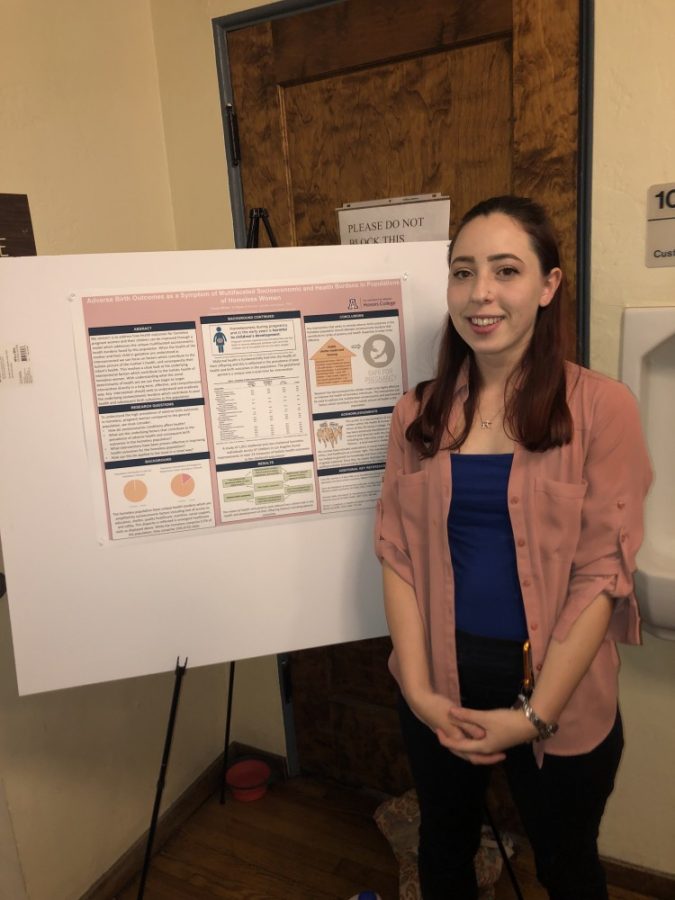The Senior Cohort of the Health and Human Values Honors College minor hosted their first poster presentation at the Slonaker House living room on Wednesday, Dec. 5.
The Health and Human Values Honors College minor is designed to provide a unique and interdisciplinary perspective that challenges scientific and western thinking. Each student conducted a semester-long thesis or proposal to seek understanding and intervention on social issues with respect to health and healthcare.
The topics covered included traditional Chinese medicine, current healthcare coverage policies, mental health in aging populations, community para medicine and health on the UA campus.
Gabriella Liace, a molecular and cellular biology major with a minor in physiology, biochemistry and honor human values, dedicated her time to analyzing how intravenous drug users are being limited in harm reduction methods because of who they are and the stigma related to their disease.
RELATED: Tales within the walls: How a family home turned into the UA Key Desk
Her research question investigated if these intravenous drug users living with HIV/AIDS benefit from the reduction of stigma and increase of structural competency micro- and macro-levels, and, if so, how.
“In the United States we are not legally able to fund needle-exchange programs, meaning we cannot give clean needles to this community,” Liace said. “For their syringe service program, they do health education brochures, alcohol wipes and cotton balls. That’s kind of the limits of these programs, and that is not what these people need. They need harm reduction efforts so that this is not a perceptual problem.”
She found that not only were these people being limited in treatment, but their total treatment cost is much higher, which has made the development of prevention efforts and good needle-exchange programs much harder.
On the micro-level, some scientists have blamed prostitution and drugs for the heinous disease, which generates negative attention in the general public opinion, Liace said, which then affects the macro-level structural competencies.
On the macro-level, those scientists are the people in charge of generating funding and forming research committees, she added. They end up being detrimental to the community by refusing to fund programs that will help the HIV/AIDS community. Through her research, she found that an investment of $64 million would result in an estimated $193 million in savings by preventing 500 new HIV infections.
Liace’s thesis aimed to inform people about the huge gap in funding and programs for intravenous drug users, in addition to explaining how an expansion of resources and a needle-exchange program would change the Pima County community.
RELATED: UA student pursues her dreams as a Rhodes Scholar
CJ Ryan, another student who presented at this event, committed her semester to her thesis “Adverse Birth Outcomes as a Symptom of Multifaceted Socioeconomic and Health Burdens in Populations of Homeless Women.”
She proposed a model that addresses how health outcomes for pregnant women experiencing homelessness can be improved. Poor conditions that are connected to socio-economic burdens do contribute to poor health and subsequent birth outcomes among this population.
Ryan found that unique health burdens, such as lack of education, shelter, healthcare, nutrition and safety, could be harmful to fetus development. Therefore, the gestational period is crucial.
“Any intervention that seeks to remedy adverse birth outcomes in the homeless population should alleviate socio-economic burdens that contribute to cycles of poverty and health disparities in order to be effective,” Ryan said.
Her research demonstrated that the shelter model is the most highly effective in improving the health of homeless individuals.
Ryan said she is interested in reducing adverse birth outcomes, because although the U.S. spends more on healthcare than any other nation, it also has one of the worse birth outcomes of any developed nation. Therefore, she said she found this issue to be particularly important to her because she wants to be an OB/GYN.
Follow Daily Wildcat on Twitter















